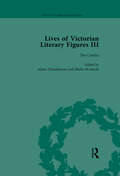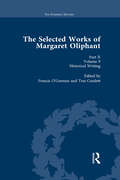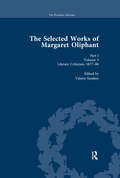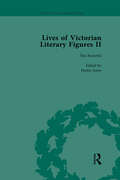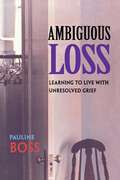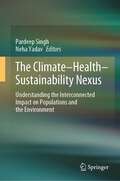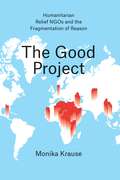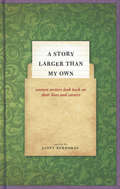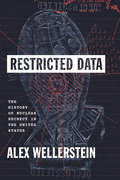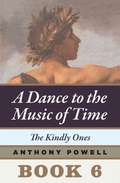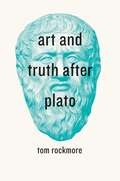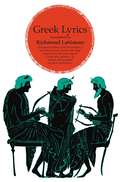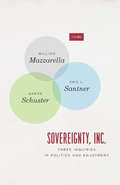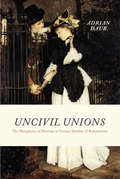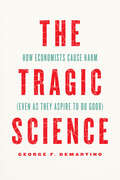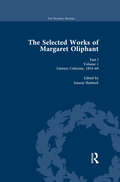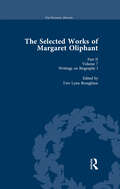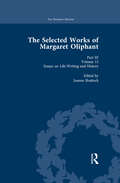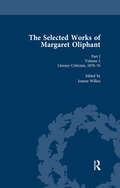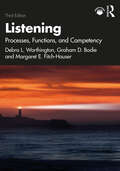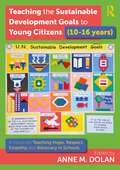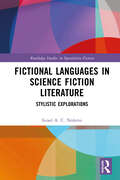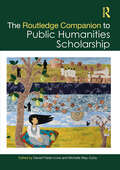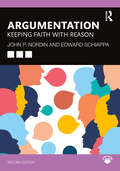- Table View
- List View
Lives of Victorian Literary Figures, Part III, Volume 2: Elizabeth Gaskell, the Carlyles and John Ruskin
by Ralph Pite Valerie Sanders Aileen Christianson Simon Grimble Sheila A McintoshThomas and Jane Welsh Carlyle moved from rural Scotland to London's Cheyne Walk. This title focuses on writers for whom 'the centre' was a pressing concern. Elizabeth Gaskell, like her contemporary Emily Bronte, was from the north of England, though based in Lancashire and Cheshire rather than Yorkshire. Her first novel, Mary Barton 1848) was set in the north and was unusually realistic in its depiction of Manchester working-class life. Ruskin grew up in suburban London; in later life, he settled in the Lake District . The three volumes that comprise a set are facsimile reproductions of contemporary biographical material. They include letters, memoirs, poems and articles on three outstanding Victorian literary persons: John Ruskin, Elzabeth Gaskell and the Carlyles.
The Selected Works of Margaret Oliphant, Part II Volume 9: Historical Writing
by Tess Cosslett Francis O’GormanMargaret Oliphant (1828-97) had a prolific literary career that spanned almost fifty years. She wrote some 98 novels, fifty or more short stories, twenty-five works of non-fiction, including biographies and historic guides to European cities, and more than three hundred periodical articles. This is the most ambitious critical edition of her work.
The Selected Works of Margaret Oliphant, Part I Volume 3: Literary Criticism 1877-86
by Valerie SandersMargaret Oliphant (1828-97) had a prolific literary career that spanned almost fifty years. She wrote some 98 novels, fifty or more short stories, twenty-five works of non-fiction, including biographies and historic guides to European cities, and more than three hundred periodical articles. This is the most ambitious critical edition of her work.
Lives of Victorian Literary Figures, Part II, Volume 3: The Rossettis
by Hester JonesThe three volumes that comprise this set are facsimile reproductions of contemporary biographical material. They include letters, memoirs, poems and articles on three outstanding Victorian literary partnerships. These are the Brownings, Brontes and the Rossettis.
Ambiguous Loss: Learning to Live with Unresolved Grief
by Pauline BossWhen a loved one dies we mourn our loss. We take comfort in the rituals that mark the passing, and we turn to those around us for support. But what happens when there is no closure, when a family member or a friend who may be still alive is lost to us nonetheless? How, for example, does the mother whose soldier son is missing in action, or the family of an Alzheimer’s patient who is suffering from severe dementia, deal with the uncertainty surrounding this kind of loss?In this sensitive and lucid account, Pauline Boss explains that, all too often, those confronted with such ambiguous loss fluctuate between hope and hopelessness. Suffered too long, these emotions can deaden feeling and make it impossible for people to move on with their lives. Yet the central message of this book is that they can move on. Drawing on her research and clinical experience, Boss suggests strategies that can cushion the pain and help families come to terms with their grief. Her work features the heartening narratives of those who cope with ambiguous loss and manage to leave their sadness behind, including those who have lost family members to divorce, immigration, adoption, chronic mental illness, and brain injury. With its message of hope, this eloquent book offers guidance and understanding to those struggling to regain their lives.
The Climate-Health-Sustainability Nexus: Understanding the Interconnected Impact on Populations and the Environment
by Neha Yadav Pardeep SinghIn a compelling scholarly journey, this book unfolds the intricate narratives of human progress and its environmental repercussions catalyzed by the Industrial Revolution. It thoughtfully contrasts the exploitative environmental ideologies stemming from colonization and industrialization against the profound yet often marginalized indigenous ecological philosophies, urging a pivotal shift in environmental stewardship. The narrative meticulously traces the arc of scientific discovery and environmental policy evolution, from Eunice Foote’s groundbreaking hypothesis on the greenhouse effect to the landmark achievements of the Paris Agreement, encapsulating over a century of environmental activism and scholarly debate. The discourse extends beyond traditional environmental concerns, exploring the intersection of climate change with public health, food security, and gender disparities, underscoring the urgency of sustainable agricultural practices and the pivotal role of women in food systems. It introduces the transformative potential of digital health innovations and renewable energy technologies as crucial tools in climate mitigation, highlighting the need for an integrated socio-technical governance model that includes community resilience and biopsychosocial health. The book critically addresses the dynamics of climate finance, advocating for inclusive green growth through strategic renewable energy investments, and revisits the ‘Tragedy of the Commons’ to challenge conventional views on communal resource management. It advocates for a justice-oriented approach to tackling the multifaceted environmental, social, and economic challenges, with a particular lens on the adverse impacts borne by marginalized communities in the Global South. Furthermore, it explores the untapped potential of wild genetic resources in bolstering food security. It aligns with the United Nations’ Sustainable Development Goals, advocating for integrating Indigenous wisdom into urban development strategies. This book is a call to action, serving as a comprehensive scholarly examination that addresses the multifaceted challenges of climate change, health, and sustainability and champions a collective approach towards forging a sustainable and equitable future.
The Good Project: Humanitarian Relief NGOs and the Fragmentation of Reason
by Monika KrauseNGOs set out to save lives, relieve suffering, and service basic human needs. They are committed to serving people across national borders and without regard to race, ethnicity, gender, or religion, and they offer crucial help during earthquakes, tsunamis, wars, and pandemics. But with so many ailing areas in need of assistance, how do these organizations decide where to go—and who gets the aid? In The Good Project, Monika Krause dives into the intricacies of the decision-making process at NGOs and uncovers a basic truth: It may be the case that relief agencies try to help people but, in practical terms, the main focus of their work is to produce projects. Agencies sell projects to key institutional donors, and in the process the project and its beneficiaries become commodities. In an effort to guarantee a successful project, organizations are incentivized to help those who are easy to help, while those who are hardest to help often receive no assistance at all. The poorest of the world are made to compete against each other to become projects—and in exchange they offer legitimacy to aid agencies and donor governments. Sure to be controversial, The Good Project offers a provocative new perspective on how NGOs succeed and fail on a local and global level.
A Story Larger than My Own: Women Writers Look Back on Their Lives and Careers
by Janet BurrowayIn 1955, Maxine Kumin submitted a poem to the Saturday Evening Post. “Lines on a Half-Painted House” made it into the magazine—but not before Kumin was asked to produce, via her husband’s employer, verification that the poem was her original work. Kumin, who went on to win the Pulitzer Prize for poetry, was part of a groundbreaking generation of women writers who came of age during the midcentury feminist movement. By challenging the status quo and ultimately finding success for themselves, they paved the way for future generations of writers. In A Story Larger than My Own, Janet Burroway brings together Kumin, Julia Alvarez, Jane Smiley, Erica Jong, and fifteen other accomplished women of this generation to reflect on their writing lives. The essays and poems featured in this collection illustrate that even writers who achieve critical and commercial success experience a familiar pattern of highs and lows over the course of their careers. Along with success comes the pressure to sustain it, as well as a constant search for subject matter, all too frequent crises of confidence, the challenges of a changing publishing scene, and the difficulty of combining writing with the ordinary stuff of life—family, marriage, jobs. The contributors, all now over the age of sixty, also confront the effects of aging, with its paradoxical duality of new limitations and newfound freedom. Taken together, these stories offer advice from experience to writers at all stages of their careers and serve as a collective memoir of a truly remarkable generation of women.
Restricted Data: The History of Nuclear Secrecy in the United States
by Alex WellersteinThe first full history of US nuclear secrecy, from its origins in the late 1930s to our post–Cold War present. The American atomic bomb was born in secrecy. From the moment scientists first conceived of its possibility to the bombings of Hiroshima and Nagasaki and beyond, there were efforts to control the spread of nuclear information and the newly discovered scientific facts that made such powerful weapons possible. The totalizing scientific secrecy that the atomic bomb appeared to demand was new, unusual, and very nearly unprecedented. It was foreign to American science and American democracy—and potentially incompatible with both. From the beginning, this secrecy was controversial, and it was always contested. The atomic bomb was not merely the application of science to war, but the result of decades of investment in scientific education, infrastructure, and global collaboration. If secrecy became the norm, how would science survive? Drawing on troves of declassified files, including records released by the government for the first time through the author’s efforts, Restricted Data traces the complex evolution of the US nuclear secrecy regime from the first whisper of the atomic bomb through the mounting tensions of the Cold War and into the early twenty-first century. A compelling history of powerful ideas at war, it tells a story that feels distinctly American: rich, sprawling, and built on the conflict between high-minded idealism and ugly, fearful power.
The Kindly Ones: Book 6 Of A Dance To The Music Of Time (A Dance of Music and Time)
by Anthony PowellAnthony Powell’s universally acclaimed epic A Dance to the Music of Time offers a matchless panorama of twentieth-century London. Now, for the first time in decades, readers in the United States can read the books of Dance as they were originally published—as twelve individual novels—but with a twenty-first-century twist: they’re available only as e-books. As volume six, The Kindly Ones (1962), opens, rumblings from Germany recall memories of Nick Jenkins’s boyhood and his father’s service in World War I; it seems clear that all too soon, uniforms will be back in fashion. The looming threat throws the ordinary doings of life into stark relief, as Nick and his friends continue to negotiate the pitfalls of adult life. Moreland’s marriage founders, Peter Templer’s wife—his second—is clearly going mad, and Widmerpool is, disturbingly, gaining prominence in the business world even as he angles for power in the coming conflict. War, with all its deaths and disruptions, is on the way. "Anthony Powell is the best living English novelist by far. His admirers are addicts, let us face it, held in thrall by a magician."--ChicagoTribune "A book which creates a world and explores it in depth, which ponders changing relationships and values, which creates brilliantly living and diverse characters and then watches them grow and change in their milieu. . . . Powell's world is as large and as complex as Proust's."--Elizabeth Janeway, New YorkTimes "One of the most important works of fiction since the Second World War. . . . The novel looked, as it began, something like a comedy of manners; then, for a while, like a tragedy of manners; now like a vastly entertaining, deeply melancholy, yet somehow courageous statement about human experience."--Naomi Bliven, New Yorker “The most brilliant and penetrating novelist we have.”--Kingsley Amis
Art and Truth after Plato
by Tom RockmoreDespite its foundational role in the history of philosophy, Plato’s famous argument that art does not have access to truth or knowledge is now rarely examined, in part because recent philosophers have assumed that Plato’s challenge was resolved long ago. In Art and Truth after Plato, Tom Rockmore argues that Plato has in fact never been satisfactorily answered—and to demonstrate that, he offers a comprehensive account of Plato’s influence through nearly the whole history of Western aesthetics. Rockmore offers a cogent reading of the post-Platonic aesthetic tradition as a series of responses to Plato’s position, examining a stunning diversity of thinkers and ideas. He visits Aristotle’s Poetics, the medieval Christians, Kant’s Critique of Judgment, Hegel’s phenomenology, Marxism, social realism, Heidegger, and many other works and thinkers, ending with a powerful synthesis that lands on four central aesthetic arguments that philosophers have debated. More than a mere history of aesthetics, Art and Truth after Plato presents a fresh look at an ancient question, bringing it into contemporary relief.
Capital of Mind: The Idea of a Modern American University
by Adam R. NelsonThe second volume of an ambitious new economic history of American higher education.Capital of Mind is the second volume in a breathtakingly ambitious new economic history of American higher education. Picking up from the first volume, Exchange of Ideas, Adam R. Nelson looks at the early decades of the nineteenth century, explaining how the idea of the modern university arose from a set of institutional and ideological reforms designed to foster the mass production and mass consumption of knowledge. This “industrialization of ideas” mirrored the industrialization of the American economy and catered to the demands of a new industrial middle class for practical and professional education. From Harvard in the north to the University of Virginia in the south, new experiments with the idea of a university elicited intense debate about the role of scholarship in national development and international competition, and whether higher education should be supported by public funds, especially in periods of fiscal austerity. The history of capitalism and the history of the university, Nelson reveals, are intimately intertwined—which raises a host of important questions that remain salient today. How do we understand knowledge and education as commercial goods? Should they be public or private? Who should pay for them? And, fundamentally, what is the optimal system of higher education for a capitalist democracy?
Greek Lyrics: More than a Hundred Poems and Poetic Fragments from the Great Age of Greek Lyric Poetry
by Richmond LattimoreA collection of more than one hundred poems and poetic fragments from the golden age of Greek Lyric poetry. In this second edition of Greek Lyrics, translator and editor Richmond Lattimore brings together a vast assortment of seventh-and sixth-century Greek lyric, elegiac, and iambic poetry. For the Greekless student or curious scholar, these translations showcase the diversity of poetic subjects in classical antiquity, which range from love poems to medical inscriptions and drinking songs. Gracefully and robustly translated by a number of top-tier translators, this volume includes poets such as Archílochus, Callínus, Semónides of Amórgos, Hippónax, Tyrtaéus, Mimnérmus, Solon, Phocýlides, Xenóphanes, Theógnis, Terpánder, Alcman, Stesíchorus, íbycus, Sappho, Alcaéus, Anácreon, Hýbrias, Praxílla, Corínna, Simónides of Ceos, Pindar, and Bacchýlides.
Sovereignty, Inc.: Three Inquiries in Politics and Enjoyment (TRIOS)
by William Mazzarella Aaron Schuster Eric L. SatnerWhat does the name Trump stand for? If branding now rules over the production of value, as the coauthors of Sovereignty, Inc. argue, then Trump assumes the status of a master brand whose primary activity is the compulsive work of self-branding—such is the new sovereignty business in which, whether one belongs to his base or not, we are all “incorporated.” Drawing on anthropology, political theory, philosophy, psychoanalysis, and theater, William Mazzarella, Eric L. Santner, and Aaron Schuster show how politics in the age of Trump functions by mobilizing a contradictory and convoluted enjoyment, an explosive mixture of drives and fantasies that eludes existing portraits of our era. The current political moment turns out to be not so much exceptional as exceptionally revealing of the constitutive tension between enjoyment and economy that has always been a key component of the social order. Santner analyzes the collective dream-work that sustains a new sort of authoritarian charisma or mana, a mana-facturing process that keeps us riveted to an excessively carnal incorporation of sovereignty. Mazzarella examines the contemporary merger of consumer brand and political brand and the cross-contamination of politics and economics, warning against all too easy laments about the corruption of politics by marketing. Schuster, focusing on the extreme theatricality and self-satirical comedy of the present, shows how authority reasserts itself at the very moment of distrust and disillusionment in the system, profiting off its supposed decline. A dazzling diagnostic of our present, Sovereignty, Inc., forces us to come to terms with our complicity in Trump’s political presence and will immediately take its place in discussions of contemporary politics.
Uncivil Unions: The Metaphysics of Marriage in German Idealism & Romanticism
by Adrian Daub“What a strange invention marriage is!” wrote Kierkegaard. “Is it the expression of that inexplicable erotic sentiment, that concordant elective affinity of souls, or is it a duty or a partnership . . . or is it a little of all that?”Like Kierkegaard a few decades later, many of Germany’s most influential thinkers at the turn of the eighteenth century wondered about the nature of marriage but rejected the easy answers provided by biology and theology. In Uncivil Unions, Adrian Daub presents a truly interdisciplinary look at the story of a generation of philosophers, poets, and intellectuals who turned away from theology, reason, common sense, and empirical observation to provide a purely metaphysical justification of marriage.Through close readings of philosophers like Fichte and Schlegel, and novelists like Sophie Mereau and Jean Paul, Daub charts the development of this new concept of marriage with an insightful blend of philosophy, cultural studies, and theory. The author delves deeply into the lives and work of the romantic and idealist poets and thinkers whose beliefs about marriage continue to shape ideas about gender, marriage, and sex to the present day.
The Tragic Science: How Economists Cause Harm (Even as They Aspire to Do Good)
by George F. DeMartinoA forceful critique of the social science that has ruled—and damaged—the modern world. The practice of economics, as economists will tell you, is a powerful force for good. Economists are the guardians of the world’s economies and financial systems. The applications of economic theory can alleviate poverty, reduce disease, and promote sustainability. While this narrative has been successfully propagated by economists, it belies a more challenging truth: economic interventions, including those economists deem successful, also cause harm. Sometimes the harm is manageable and short-lived. But just as often the harm is deep, enduring, and even irreparable. And too often the harm falls on those least able to survive it. In The Tragic Science, George F. DeMartino says what economists have too long repressed: that economists do great harm even as they aspire to do good. Economist-induced harm, DeMartino shows, results in part from economists’ “irreparable ignorance”—from the fact that they know far less than they tend to believe they know—and from disciplinary training that treats the human tolls of economic policies and interventions as simply the costs of promoting social betterment. DeMartino details the complicated nature of economic harm, explores economists’ frequent failure to recognize it, and makes a sobering case for professional humility and for genuine respect for those who stand to be harmed by economists’ practice. At a moment in history when the economics profession holds enormous power, DeMartino’s work demonstrates the downside of its influence and the responsibility facing those who practice the tragic science.
The Selected Works of Margaret Oliphant, Part I Volume 1: Literary Criticism 1854-69 (The\pickering Masters Ser.)
by Elisabeth Jay Joanne ShattockMargaret Oliphant (1828-97) had a prolific literary career that spanned almost fifty years. She wrote some 98 novels, fifty or more short stories, twenty-five works of non-fiction, including biographies and historic guides to European cities, and more than three hundred periodical articles. This is the most ambitious critical edition of her work.
The Selected Works of Margaret Oliphant, Part II Volume 7: Writings on Biography I
by Trev Lynn BroughtonMargaret Oliphant (1828-97) had a prolific literary career that spanned almost fifty years. She wrote some 98 novels, fifty or more short stories, twenty-five works of non-fiction, including biographies and historic guides to European cities, and more than three hundred periodical articles. This is the most ambitious critical edition of her work.
The Selected Works of Margaret Oliphant, Part III Volume 13: Essays on Life-Writing and History
by Joanne ShattockMargaret Oliphant (1828-97) had a prolific literary career that spanned almost fifty years. She wrote some 98 novels, fifty or more short stories, twenty-five works of non-fiction, including biographies and historic guides to European cities, and more than three hundred periodical articles. This is the most ambitious critical edition of her work.
The Selected Works of Margaret Oliphant, Part I Volume 2: Literary Criticism 1870-76
by Joanne WilkesMargaret Oliphant (1828-97) had a prolific literary career that spanned almost fifty years. She wrote some 98 novels, fifty or more short stories, twenty-five works of non-fiction, including biographies and historic guides to European cities, and more than three hundred periodical articles. This is the most ambitious critical edition of her work.
Listening: Processes, Functions, and Competency
by Debra L. Worthington Margaret E. Fitch-Hauser Graham D. BodieThis fully revised third edition explores the essential role of listening to human communication across contexts and cultures.Based on the premise that listening is a goal-directed activity, this book blends theory with practical application and builds knowledge, insight, and skills to help the reader become a more effective listener. In this new edition, theory and research has been updated with an emphasis on how the growing reliance on mediated communication affects how individuals communicate in their personal, professional, and educational lives. It introduces students to emerging concepts and methods such as neurodiversity and fMRI as well as evolving professional and educational contexts including aural architecture and "the musical brain".Addressing listening as a cognitive process, social function, and critical professional competency, this is an essential textbook for undergraduate courses in listening and communication studies.In addition to a fully updated instructor’s manual containing discussion questions, activities and assignments, and exam questions, this new edition includes PowerPoint slides and videos. They are available at http://www.routledge.com/9781032491257.
Teaching the Sustainable Development Goals to Young Citizens (10-16 years): A Focus on Teaching Hope, Respect, Empathy and Advocacy in Schools
by Anne M. DolanWith the current climate and economic crises, education for sustainability has never been more critical. This timely and essential book encourages readers to rethink our current values systems and to interrogate common assumptions about our world. Written for all educators with an interest in sustainability, chapters address several possible future scenarios for our planet, allowing readers to make more educated choices about sustainability and to transfer this knowledge to students within the classroom.Each chapter focuses on a specific Sustainable Development Goal. Beginning with a brief historical and theoretical introduction to contextualise the goal, chapters then showcase the practical activities, case studies and exemplars that teachers can adopt when teaching. Topics explored include, but are not limited to: Poverty Renewable energy Climate change Peace and justice Human rights Access to education This book is an essential classroom resource for any teacher or student teacher wishing to promote the Sustainable Development Goals and to teach for a better and brighter future.
Fictional Languages in Science Fiction Literature: Stylistic Explorations (Routledge Studies in Speculative Fiction)
by Israel A. NolettoFictional Languages in Science Fiction Literature surveys a large number of fictional languages, those created as part of a literary world, to present a multifaceted account of the literary phenomenon of glossopoesis (language invention). Consisting of a few untranslated sentences, exotic names, or even fully-fledged languages with detailed grammar and vocabulary, fictional languages have been a common element of English-language fiction since Thomas More’s Utopia (1516).Different notions of the functions of such fictional languages in narrative have been proposed: as rooted in phonaesthetics and contextual features, or as being used for characterisation and construction of alterity. Framed within stylistics and informed by narrative theory, literary theory, literary pragmatics, and semiotics, this study combines previous typologies into a new 5-part reading model comprising unique analytical approaches tailored to science fiction’s specific discourse and style, exploring the relationship between glossopoesis, world-building, storytelling, interpretation, and rhetoric, both in prose and paratexts.
The Routledge Companion to Public Humanities Scholarship (Routledge Literature Companions)
by Daniel Fisher-Livne Michelle May-CurryAcross humanities disciplines, public scholarship brings academics and community members and organizations together in mutually-beneficial partnership for research, teaching, and programming. While the field of publicly engaged humanities scholarship has been growing for some time, there are few volumes that have attempted to define and represent its scope. The Routledge Companion to Public Humanities Scholarship brings together wide-ranging case studies sharing perspectives on this work, grounded in its practice in the United States.The collection begins with chapters reflecting on theories and practices of public humanities scholarship. The case studies that follow are organized around six areas of particular impact in public humanities scholarship: Informing contemporary debates; amplifying community voices and histories; helping individuals and communities navigate difficult experiences; preserving culture in times of crisis and change; expanding educational access; and building and supporting public scholarship. The Companion concludes with a glossary, introducing select concepts. Taken together, these resources offer an overview for students and practitioners of public humanities scholarship, creating an accessible vocabulary rooted in the practices that have so advanced academic and community life.Although drawing on case studies from the US, these examples offer perspectives and insights relevant to public humanities around the world. This book will be of interest to anyone working within the public humanities or wanting to make their work public and engage with wider communities.
Argumentation: Keeping Faith with Reason
by Edward Schiappa John P. NordinThis extensively updated second edition provides a comprehensive introduction to argumentation skills for undergraduates.Clearly written, with minimal technical jargon, the book features many contemporary real-world examples. Through a unique conceptual framework, students will learn how to assemble a coherent logical argument, assess sources, and organize and present written and verbal arguments. The authors use the Toulmin model throughout to present issues and clarify concepts and have expanded the model to show how it can be used to examine real-world arguments. This new edition provides a deeper focus on value claims and credibility. It also shows students how to assess fake news, misinformation, and post-truth and incorporates more social scientific theories of persuasion such as the Elaboration Likelihood Model.Argumentation: Keeping Faith with Reason is an ideal textbook for undergraduate courses in argumentation, persuasion, critical thinking, and informal logic.An Instructor’s Manual including advice on how to teach each section, sample quizzes, and additional examples is available at https://routledge.com/9781032541228.
